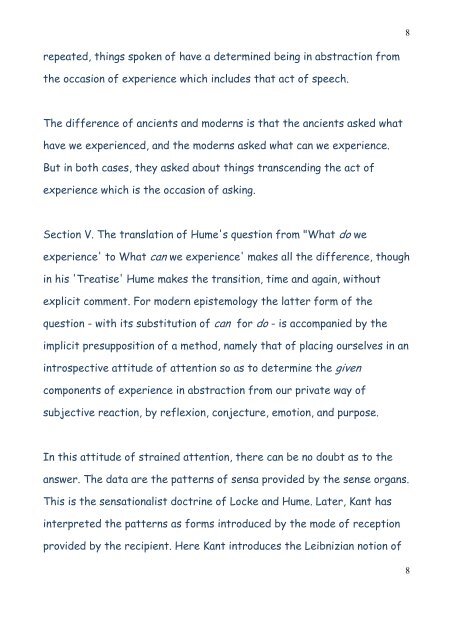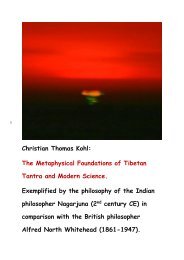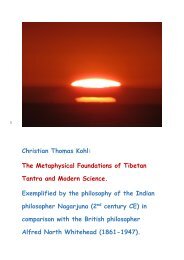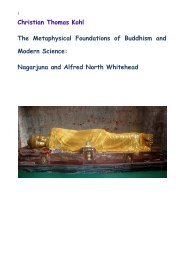The Metaphysical Foundation of Buddhism and Modern Science
The Metaphysical Foundations of Buddhism and Modern Science: Nagarjuna and Alfred North Whitehead
The Metaphysical Foundations of Buddhism and Modern Science: Nagarjuna and Alfred North Whitehead
Create successful ePaper yourself
Turn your PDF publications into a flip-book with our unique Google optimized e-Paper software.
8<br />
repeated, things spoken <strong>of</strong> have a determined being in abstraction from<br />
the occasion <strong>of</strong> experience which includes that act <strong>of</strong> speech.<br />
<strong>The</strong> difference <strong>of</strong> ancients <strong>and</strong> moderns is that the ancients asked what<br />
have we experienced, <strong>and</strong> the moderns asked what can we experience.<br />
But in both cases, they asked about things transcending the act <strong>of</strong><br />
experience which is the occasion <strong>of</strong> asking.<br />
Section V. <strong>The</strong> translation <strong>of</strong> Hume's question from "What do we<br />
experience' to What can we experience' makes all the difference, though<br />
in his 'Treatise' Hume makes the transition, time <strong>and</strong> again, without<br />
explicit comment. For modern epistemology the latter form <strong>of</strong> the<br />
question - with its substitution <strong>of</strong> can for do - is accompanied by the<br />
implicit presupposition <strong>of</strong> a method, namely that <strong>of</strong> placing ourselves in an<br />
introspective attitude <strong>of</strong> attention so as to determine the given<br />
components <strong>of</strong> experience in abstraction from our private way <strong>of</strong><br />
subjective reaction, by reflexion, conjecture, emotion, <strong>and</strong> purpose.<br />
In this attitude <strong>of</strong> strained attention, there can be no doubt as to the<br />
answer. <strong>The</strong> data are the patterns <strong>of</strong> sensa provided by the sense organs.<br />
This is the sensationalist doctrine <strong>of</strong> Locke <strong>and</strong> Hume. Later, Kant has<br />
interpreted the patterns as forms introduced by the mode <strong>of</strong> reception<br />
provided by the recipient. Here Kant introduces the Leibnizian notion <strong>of</strong><br />
8


















